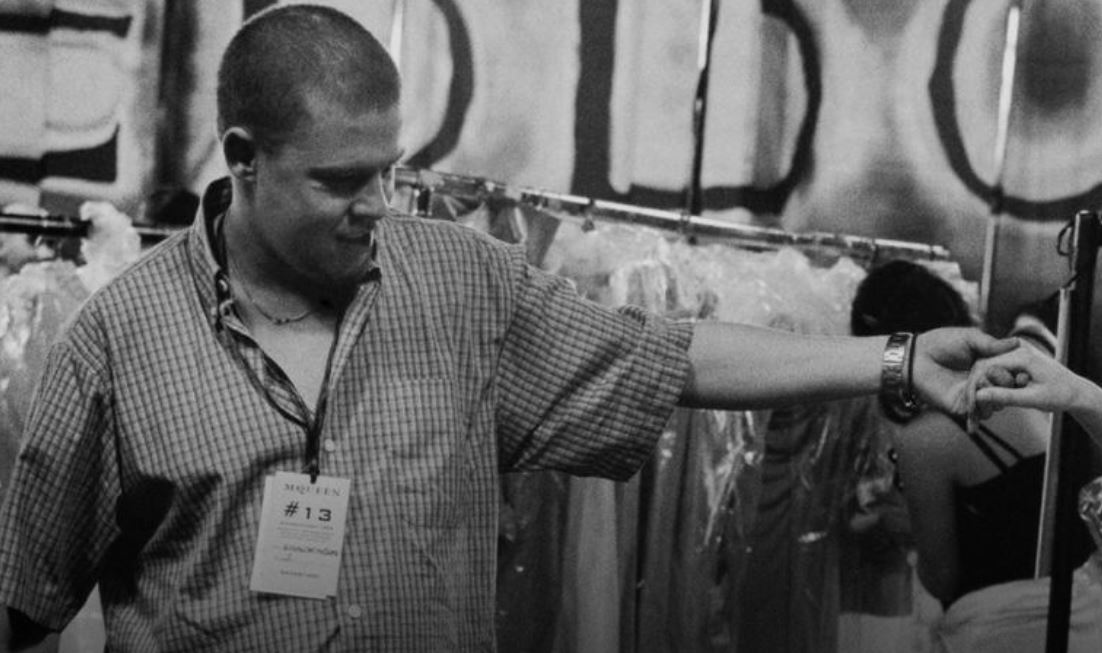At the Edinburgh Filmhouse from Tue 10 Jul 2018
Even viewers without any remote interest in the world of fashion cannot fail to be convinced of the artistic genius of Alexander McQueen after watching this emotionally powerful documentary by Ian Bonhôte and Peter Ettedgui.
The central sense of contradiction that permeates the film is established in the opening sequence, when the sumptuous music and majestic visuals of the intro are juxtaposed with wobbly home video footage of the mundane interior of McQueen’s unglamorous childhood home in Stratford.
This sense of dialectical opposition characterised both McQueen’s personality and his artistic output. Before taking his own life at the age of 40 in 2010, McQueen seemed to, at all times, simultaneously inhabit oppositional worlds. A proudly working class designer who cut his teeth padding lapels at Savile Row, McQueen was determined to achieve recognition and acceptance among the fashion elite. Although he agreed to drop his real name, Lee, and give the brand a sense of grandeur by adopting the more regal-sounding Alexander, he remained profoundly unpretentious and critical of the superficial, anodyne nature of the fashion world. McQueen thrived on controversy – his outrageous and confrontational shows were influenced by his rebellious and irreverent personality, and his acute anti-establishment streak. His conflicting desire to achieve legitimacy and impulse to provoke outrage is epitomised in the film when we hear of him instructing his models at London fashion week, whom he’d dressed in scandalously low-slung trousers, to attract the attention of Anna Wintour by shoving their pubic hair in her face.
One of the many admirable qualities in McQueen that shines through in the film is his abject refusal to be patronised. He and his family react against the condescending “rags to riches” narrative often imposed on him. Although his stratospheric rise to fame was aided by the public endorsement and support of mentor Isabella Blow, his refusal to provide her with payback in the form of a company position is testament to his unfailing self-confidence and belief in his own talent. He furiously rejected any suggestion that he’d been “discovered”, “made” or owed any part of his success to anyone but himself. His family bristle at patronising references in the press to his humble origins. Comments by Bobby Hillson, his former tutor at Central Saint Martin’s, that he’d arrived at college looking “very shabby”, that he’d had “no formal education” and that his background was less “conventional” than her other students seem overtly classist and inaccurate, while her statement that he once told her his success was “all down to her” seems entirely laughable.
Such displays of snobbery provide context for McQueen’s desire to rebel and his resentment towards the industry types he refers to as “the luvvies”. We can begin to understand the increasing discomfort and unstable sense of identity he experienced as his fame grew. This inescapable feeling of unease and inner conflict exacerbated McQueen’s already precarious mental health. Haunted by the sexual abuse and domestic violence he had experienced in childhood, McQueen battled in private with the depression that would eventually consume him.
His inner darkness and the visceral fury he felt towards his abuser influenced much of his work. The autobiographical nature of his shows was sometimes missed or overlooked by critics, who tended to read him as merely provocative and attention-seeking. The documentary highlights the negative reaction to his hugely controversial Highland Rape show in 1995, for which he was denounced for misogyny. It’s tempting to wonder if the show would elicit a more positive response and be interpreted as a protest against gender violence if shown today in the era of “Me Too” and “Time’s Up”.
The devastation his death caused to his friends and family is palpable in the film. The sense of tragedy is underlined by the beautiful, dramatic soundtrack by Michael Nyman. The poignancy is enhanced by the knowledge that McQueen greatly admired Nyman’s music and often sought inspiration by listening to the soundtrack to The Piano. The documentary is appropriately aesthetically sleek, expertly-crafted and well-structured. McQueen is therefore a fitting tribute to truly exceptional artist.
